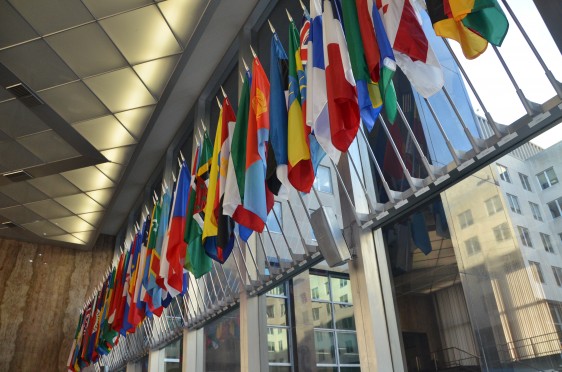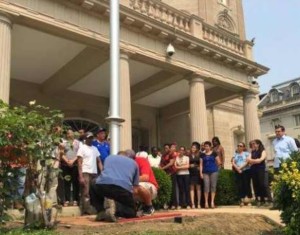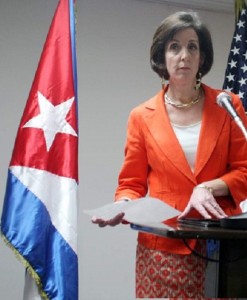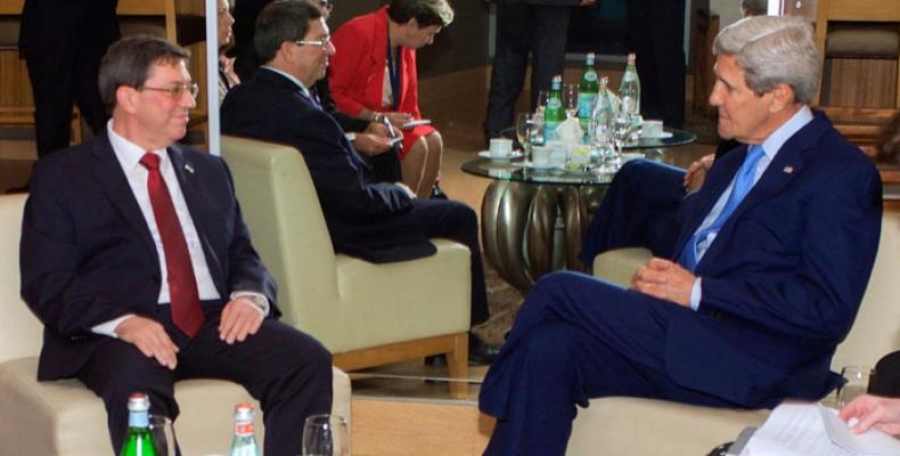
Cuban flag will be raised Monday at State Department
Attention in Washington will be focused on Cuba on Monday (July 20) when the Cuban Interests Section building becomes the Embassy of the Republic of Cuba and that nation’s flag is placed in one of the halls of the State Department building.

Details of the activities planned for Monday were revealed by John Kirby, a State Department spokesman, during a press briefing on Friday (July 17).
At 1 o’clock, Secretary John Kerry will meet with his Cuban counterpart, Foreign Minister Bruno Rodriguez Parrilla, at the State Department, Kirby said. After that meeting, there will be a “press availability” with the two of them.
A Cuban flag will be raised in the atrium on the C Street entrance of the building “very early in the morning” so as not to interfere with the traffic of personnel and visitors, Kirby said, pointing out that a scaffold will be needed to install the flag.
“There won’t be a ceremony accompanying [the raising.] There never is. We do this routinely,” he said. And “it’s not going to be a press event.”
The last time a flag was added to the atrium display was in 2011, when the flag of South Sudan was hung. The Cuban flag will be placed between the flags of Croatia and Cyprus.

Asked by a reporter when Kerry might travel to Havana, Kirby claimed not to have that information but said that “the Secretary is very much looking forward to going down there and formally opening our embassy in Havana. I think that’s going to happen soon.”
[The news agency Reuters reported Saturday that the U.S. Embassy will be formally activated in August.]
Kerry “is not planning to be at the formal opening of the Cuban Embassy” on Monday, Kirby said, so the United States government will be represented by Assistant Secretary Roberta Jacobson, chief U.S. delegate at the talks leading to the reestablishment of diplomatic relations.
“There will likely be other representatives from the State Department […] but Assistant Secretary Jacobson will be the most senior person,” the spokesman said. Reportedly, Jeffrey DeLaurentis, chief of the U.S. Interests Section in Havana, will be among those representatives.
Gustavo Machín, deputy director of the U.S. Desk at the Cuban Foreign Ministry, said that Cuba has invited about 500 people to the opening of its embassy, among them members of Congress, business executives, experts from think tanks and leaders of nongovernmental organizations. Guests from Cuba are already arriving in Washington.
Asked if the State Department has “all the assurances necessary that [U.S.] diplomats will be able to work freely in Havana, as they do in other countries,” Kirby quoted a previous statement by Jacobson.
“We’re comfortable that our diplomats will be able to do the work they need to do in Cuba,” he said. “It is not a restriction-free environment, as I think you can understand, but we’re comfortable that — through the negotiations that we had with Cuban authorities — they will be able to do the job that they need to do.”
At their 1 p.m. meeting, Kerry and Rodríguez will have “a substantive discussion,” Kirby said. “There is still a lot of work to do and still a lot of issues to discuss. I fully expect that it’ll be a meaningful discussion. […] They’re meeting at 1 and they won’t be coming out to talk to you until 1:45, so it’s going to be more than just a passing handshake and a photo. They’re going to actually sit down and talk.”

This will be the second meeting between the two diplomats since Dec. 17, when both countries announced their plans to restore diplomatic relations. They first met in early April in Panama on the eve of the Seventh Summit of the Americas.
“We’ve had a series of conversations about telecommunications, about access to telecommunications,” Kirby said, expanding on his answer.
Also, “conversations that have expanded the discussion on coordination on health issues. We began a conversation that I suspect will continue on human rights, which we know is going to be a part of this new relationship. We’ve had conversations about migration. And I think we’ve made it clear publicly that going forward we both agree – both countries – to have conversations about fugitives in law enforcement.
“So there’s many, many issues that are still very much active in terms of discussion. We fully expect that there will continue to be issues that we don’t see eye-to-eye on. That’s not unusual with any relationship we have around the world, particularly now with a country that for the first time we’re going to be re-establishing diplomatic relations with.”
Kirby repeated that, “again, Secretary Kerry is very excited about this opportunity, and to having these discussions and to trying to work through these issues. “So there’s many, many issues that are still very much active in terms of discussion.”
[Photo at top of the lobby of State Department with flags of more than 150 countries that maintain relations with the U.S.]

